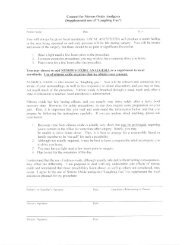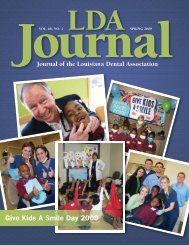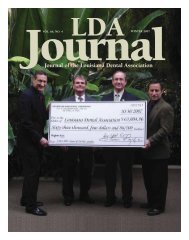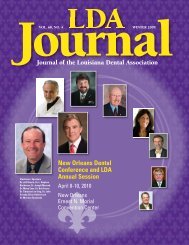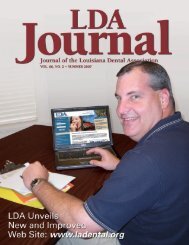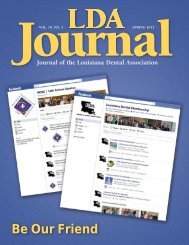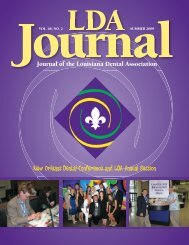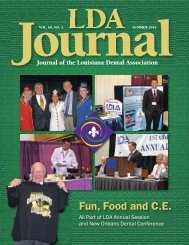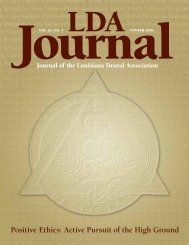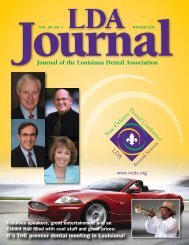LDA Journal - Louisiana Dental Association
LDA Journal - Louisiana Dental Association
LDA Journal - Louisiana Dental Association
- No tags were found...
You also want an ePaper? Increase the reach of your titles
YUMPU automatically turns print PDFs into web optimized ePapers that Google loves.
<strong>LDA</strong><br />
state treasurer<br />
John Kennedy, <strong>Louisiana</strong> State Treasurer<br />
<strong>Louisiana</strong>’s START and Unclaimed Property<br />
Programs<br />
START<br />
The dream of sending a child to college is becoming a<br />
reality for more <strong>Louisiana</strong> citizens. Thanks to <strong>Louisiana</strong>’s<br />
Tuition Opportunity Program for Students (TOPS), more<br />
of our state’s students are taking advantage of higher<br />
education opportunities. In addition to TOPS, there is<br />
another way parents can afford the costs of higher education,<br />
especially necessary expenditures such as books, supplies,<br />
and room and board. You have probably heard about<br />
529 plans and how great they are for saving for college.<br />
START is <strong>Louisiana</strong>’s 529 college savings program, and it<br />
is one of the best in the nation.<br />
Here’s how START works. Parents, grandparents or<br />
other individuals can open an account for a child with<br />
as little as $10. They continue to invest what they are<br />
comfortable with, whether it’s $10 a year or $10,000.<br />
START account owners can invest in fixed income<br />
investments managed by the State Treasury or a number<br />
of mutual fund options managed by the Vanguard<br />
Group. Fixed income investments in START earned<br />
5.11 percent this past year, and mutual fund investments<br />
earned 7.93 percent to 15.69 percent depending on<br />
the option.<br />
In addition to earning interest, START accounts are<br />
eligible for state matches of 2 percent to 14 percent of<br />
annual deposits depending on income and account<br />
owner category. On top of that, by taking advantage of<br />
START’s partnership with BabyMint, account owners<br />
can deposit cash rebates into their accounts when they<br />
make purchases at participating retailers. Monies<br />
deposited from these purchases will then earn interest<br />
and state matches.<br />
The START program is tax-free from start to finish,<br />
and Congress recently made the federal tax exemption<br />
on the program permanent. Account owners can exempt<br />
up to $2,400 in deposits per account per year ($4,800<br />
per account if they file a joint return) from income<br />
reported on their state tax returns. They also do not<br />
have to pay state or federal taxes on money in their accounts<br />
while it earns interest. When it is time to withdraw money<br />
for educational expenses, disbursements are also tax-free.<br />
START closed last year with 23,104 active accounts<br />
and $128 million in deposits. For more information, call<br />
my office at 225-342-0010 or click START on the Treasury’s<br />
website located at www.latreasury.com. Or, contact the<br />
Office of Student Financial Assistance at 1-800-259-5626,<br />
extension 1012 or visit www.startsaving.la.gov.<br />
Unclaimed Property<br />
Many people still do not know what “unclaimed<br />
property” is. Part of the problem is the program’s name<br />
is somewhat misleading because unclaimed property<br />
has nothing to do with physical property. A more<br />
appropriate name might be “missing money” or<br />
“forgotten money,” because that’s exactly what<br />
unclaimed property is – money that you never knew<br />
you had lost or that has gone unclaimed for a number of<br />
years.<br />
Here’s how the program works. Let’s say your landlord,<br />
employer or relative has money for you that you have<br />
never received. This money could come from paychecks,<br />
checking and savings accounts, royalties, interest,<br />
dividends, utility deposits, stock certificates and life<br />
insurance proceeds. After a certain amount of time, this<br />
money is turned over to the state for safekeeping, especially<br />
if you haven’t been actively looking for it. Many people<br />
never know that they have money out there to begin with.<br />
Your unclaimed property could be the utility deposit you<br />
forgot you had paid, a final paycheck you never cashed,<br />
or stocks you inherited that you never knew you had.<br />
One out of every six people in <strong>Louisiana</strong> has unclaimed<br />
property, so the odds of finding unclaimed money are<br />
better than playing the lottery.<br />
Over the unclaimed property program’s history, the<br />
state has collected more than $479 million and refunded<br />
more than $145.7 million. Over 80 percent of total<br />
16 <strong>LDA</strong> <strong>Journal</strong>



